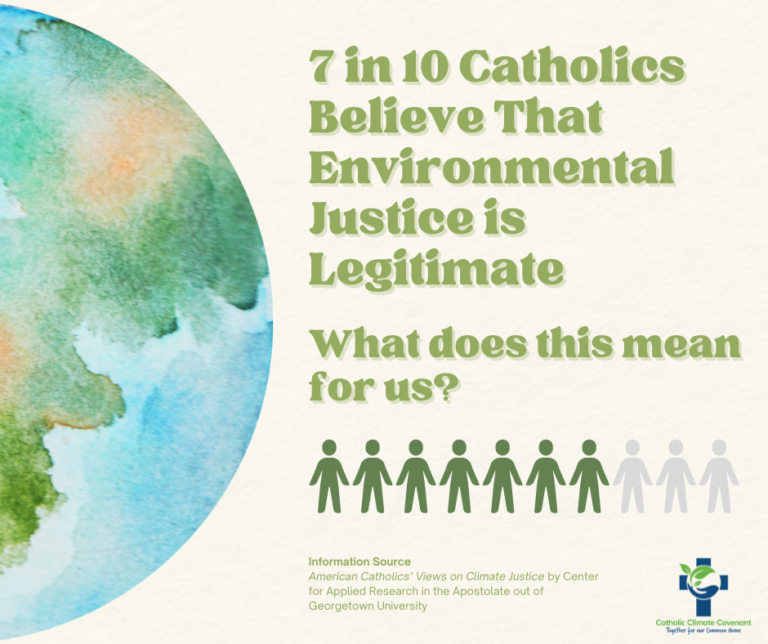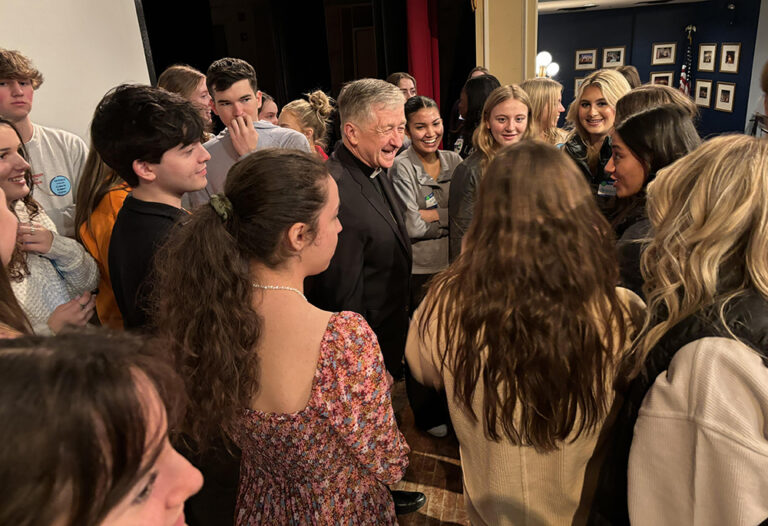Of the many things I learned from our Ecospirituality Nights series, I think this was the first – that I am not alone.
I see things differently now. I see bigger pictures and connections that I didn’t know existed before. I look out at the tree line from my porch, enjoying the view, but when I see the plume of pollution rising in the distance, I don’t feel helpless anymore. What I see doesn’t have to end with me. I can make a call, send a letter, organize a legislative visit, attend my city’s public meetings. I can talk about the issue, connect with others in my area, work with them to find a solution, and raise our voices.
Ecospirituality Nights came into being during a meeting with my supervisor, Anna Robertson, Director of Youth and Young Adult Mobilization at Catholic Climate Covenant. I told her I didn’t know much about climate justice, but I wanted to figure out how it connected to my spirituality as a Catholic. Three months later we launched the Ecospirituality Nights multi-month series, focusing on three main topics: mindfulness, integral ecology, and advocacy.
When Christina Leaño, Associate Director of Laudato Si’ Movement, spoke to us about how mindfulness “helps us cultivate the capacity to wake up,” I began thinking of the times in my life when pausing to pay attention to what was happening inside of me and around me, enabled me to make decisions from a deep place of connection. As I write this, I’m remembering a time when some friends and I went to the state fair with a young woman from Poland.
Our energetic Polish friend had never been to anything like a state fair, with all the rides and food and unique exhibits, so she was interested in exploring almost everything she saw. Upon noticing a couple of children riding a live elephant, she readily pulled us toward the line. A couple of our friends had wandered off, so I stood in line with her while our other friend said she would wait for us. We were mostly surrounded by kids and their parents, the kids jumping up and down, impatient for their turn, and then squealing with excitement once they were lifted onto the elephant’s back. The scene was nothing new, but I did start noticing things I hadn’t paid attention to before – things like the chain around the elephant’s foot, its dirty sagging body, its watering eyes, and the very little energy it had as it walked in endless circles.
I felt uneasy. I wondered if asking my friend to leave the line would ruin her trip, or if I should let her have her elephant ride. I noticed my friend’s face who was waiting for us, and she looked like she could cry. I knew she was seeing what I was seeing, but still, what about our friend who was visiting America for the first time? Then I noticed a change in her, too. I watched her as she watched the elephant, and I knew she started to see what we were seeing.
We had made it pretty close to the front of the line by this point, but my friend from Poland now looked like she was going to be sick. She turned to me as a couple of siblings were placed on the elephant’s back and said, “I’m no do this.” We left the line in a hurry, people watching with curiosity as we headed straight for the exit.
We talked about that day for a long time afterwards, recalling how none of us had to say anything, and yet we all arrived at the same conclusion. Sometimes all you need is to be aware – of yourself, the situation, or the people you’re with – and you find yourself connected to others in a way that moves you deep within.
For me, this also relates to Sr. Joan Brown’s talk on integral ecology, or as she called it, “our work [of] loving the world.” A Franciscan Sister of Rochester, NY who serves as the Executive Director of New Mexico and El Paso Region Interfaith Power and Light, Brown reminded me that the integration of spirituality and climate justice is simple. It’s a call to love the world out of love for God and for what God has created.
Finally, Sharon Lavigne’s keynote on action and advocacy emphasized God’s role in her work for climate justice, reminding me that God can work with anything and through anyone. Winner of the 2021 Goldman Environmental Prize and founder of Rise St. James, Lavigne is a former educator, a Black Catholic, and a family-oriented woman. She’s simply a human being with a big heart, and she trusts God with her life and the life of her community.
Leaño offers an example of faith; Brown an example of love; and Lavigne an example of hope. That day at the fair, I had faith in what I felt within me, love for God’s creatures, and hope that things could be different – but I wasn’t alone in any of it. That’s something I’ll remember from now on: we’re in this together.


